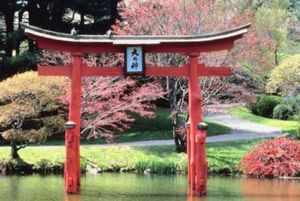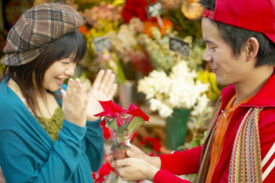Japan Gift Giving Customs
From Giftypedia
Gift giving in Japan is deeply rooted in tradition with gifts given not only for social occasions, but also for social obligations -- gifts given when indebted to others, both family and business. The emphasis is on the act of giving rather than the gift itself. The value of the gift is of less importance than the presentation and thoughtfulness in which it is presented.
In Japan, gifts are given on anniversaries, weddings, births, graduations, and housewarmings. Children's achievements are also celebrated with gifts. Though traditionally gifts are not given for birthdays or Christmas, this is becoming a modern Japan gift giving custom. Gifts or Omiyage (souvenirs) given to family, friends and co-workers are expected upon returning from a trip.
After receiving a gift, the Japanese send a "thank you" gift called an O-kaeshi. These thank you gifts are common for illnesses, funerals, weddings and births. The value of this gift usually equals half the value of the original gift.
Business Gift Giving
Business gift giving in Japan is more extravagant and prestigious when humility is not the focus. Companies spend large sums of money on gifts to their clients and customers. With businesses gift giving, a sense of competition develops to give the most original or thoughtful gift.
- Gift giving in Japan is a central part of Japanese business etiquette.
- Bring a range of gifts for your trip so if you are presented with a gift you will be able to reciprocate.
- There's an expectation a gift will be offered at the first meeting, and gifts will continue to be part of your business dealings. Come prepared to that first meeting with a beautifully wrapped, quality gift that's not extravagant.
- If you're bringing a gift from your home country, make sure it's not 'made in Japan'. Don't select items with your company logo. It may be seen as a promotional item and be viewed as cheap. Local food specialties from your region are appreciated.
- The emphasis in Japanese business culture is on the ritual of gift-giving, rather than the gift itself. For this reason, you may receive a gift that seems too modest, or conversely, extravagant.
- Expensive gifts are common. An expensive gift will not be perceived as a bribe.
- It is customary to comment that the gift you are presenting, even if it is extravagant, is "tsumaranai mon" ["an uninteresting or dull thing"]. This statement is meant to convey, "Our relationship is more important than this trivial item."
- A gift for an individual should be given in private.
- If you are presenting a gift to a group of people, have them all present.
- The correct Japanese etiquette is to present and receive gifts with both hands.
- Before accepting a gift it is polite to refuse at least once or twice before accepting.
Personal Gift Giving
- For Weddings, the traditional Japanese gift giving custom is to give money to the couple. Upon returning from their honeymoon, the newly-weds bring back souvenirs to give to their wedding guests. Money should be given in an envelope and the number of bills should be an odd number as superstition suggests that the couple may split if the money can be evenly divided in two.
- For new babies, the parents give gifts commemorating the child's birth to their family and friends.
- The second Monday in January is Coming of Age Day, a national holiday dedicated to the nation's young people who have reached the age of 20. Buddhist Prayer Beads or juzu are often given as a keepsake for this occasion.
- For Valentine's Day, the Japanese woman gives chocolates (honmei choco) to the man she is serious about. For her colleagues and other male friends, she gives obligatory chocolate (giri choco).
- On March 14, White Day, the Japanese man gives more expensive chocolates or sweets back to the woman that gave him a gift on Valentine's Day.
- For children's celebrations, electronics are recommended.
- For the sick, flowers are the customary gift in Japan, and are the most popular gift to take along to the hospital. Keep in mind when choosing a gift that some flowers and plants are not appropriate to give, such as: potted plants, flowers with vivid colors or with a strong fragrance and large bouquets. Such flowers like Chrysanthemums or the quantity of 4, 9 or 13 are considered bad luck. Potted plants are seen as inappropriate gifts for the sick people because it is believed that the illness will become more severe by taking "deeper root".
Major Gift Giving Holidays
The two most popular occasions for gift giving in Japan happen twice a year. Ochugen falls during the middle of the year and Oseibo falls at the end of the year.
Ochugen originated as an offering to families who had a death in the first half of the year and still takes place two weeks before Obon, the Japanese holiday for honoring the dead. Nowadays, gifts are given as a gesture of gratitude to the people who are close to them. Bosses, colleagues, parents and relatives are common recipients.
Oseibo is more widely observed and began from the custom of placing offerings on ancestors graves. Oseibo gifts are typically given to friends, colleagues, teachers, clients or customers, and to anyone he or she is indebted to. These gifts are specifically given to pay back favors received during the year. The value of the gift does matter as the gift reflects the giver's evaluation of social indebtedness that he or she has incurred. The recipient can accurately determine the value of the relationship by the monetary value of the gift. Oseibo gifts are typically sent out by the 20th of December.
Gifts commonly given for Ochugen and Oseibo range from department store items to food and alcoholic beverages. People receiving gifts for these occasions usually express their gratitude either by writing or calling the person who gave them the gift.
Gift Wrapping
In Japanese culture, the presentation of the gift is as important as the gift itself. There are many customs and rules specifically related to the wrapping of the gift that play an important part of the gift giving custom. They even go so far as to imply your feelings towards the person receiving the gift. Our Japanese Gift Wrapping guide goes into more detail on this subject.
Re-Gifting
Postings online suggest that re-gifting is an acceptable practice in Japanese culture. One theory says this is due to people there being less likely to return a gift that doesn't suit them. Though while acceptable, when done, it appears that it's best to keep it a secret.[1][2]
General Guidelines
- Gifts are always appreciated. Consider bringing a small souvenir that represents your hometown to give to your host (especially food). Don't be surprised if your hosts give you something from their country, too. If the gift is wrapped, don't open it until you leave. If the gift is not wrapped, make sure to express lots of appreciation (whether you like it or not). Ask some questions about the gift to show your interest.
- The correct etiquette is to present/receive gifts with both hands.
- Before accepting a gift it is polite to refuse at least once or twice before accepting.
- Gifts in pairs are considered lucky. The numbers eight and three are also considered lucky. Eight stands for prosperity and three stands for birth.
- Money should be given in an envelope.
Gifts to Avoid
- Lilies, lotus blossoms, and camellias are associated with funerals. White flowers of any kind are gifts to be avoided. There is also a superstition that potted plants encourage sickness.
- Giving four or nine of anything is considered unlucky. This superstition seems to be less important nowadays.
- Red Christmas cards should be avoided, since funeral notices are customarily printed in this color.
Japanese Social Etiquette
- Always take off your shoes when you enter someone's home.
- It is polite to say "o-jama shimasu" (sorry for disturbing) when entering someone's house.
- Avoid blowing your nose in front of others. It's considered rude to blow into a handkerchief and to put it back into your pocket. Paper tissues should be used.
- You should not eat while standing up. You should always be seated. Exceptions are made for eating at a counter or eating ice cream.
- Do not point using fingers, feet or chopsticks. Pointing gestures should be made with waving fingers and the palm of your hand facing downward.
- In general, you should keep your real opinion (honne) to yourself and be polite by offering public opinions (tatemae) that are meant to maintain harmony.
- Avoid interrupting people while talking or when they are getting ready to speak.
- Business cards should be given and accepted with both hands in formal situations.
Related Guides
- Japanese Holidays
- Japanese Gift Wrapping
- International Gift Customs
- How to Avoid Controversial or Inappropriate Gifts
- Etiquette for Office / Business Gift Giving
References
Resources
- Executive Planet: Japan Gift Giving
- 1-World Global Gifts
- Buzzle.com - International Gift Giving Etiquette
- Japan-Guide.com
- HanamiWeb.com: Coming-of-Age Day in Japan
- Wa-Pedia.com: Japanese Manners and Etiquette





 Printer Friendly
Printer Friendly
